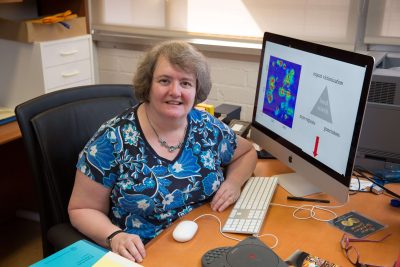
Headlines are often brimming with news of shootings, robberies and bombings. One University of California Los Angeles professor has found a way to reduce what she identifies as widespread fear of the unpredictability of crime using data analytics.
Andrea Bertozzi, who teaches mathematics and mechanical and aerospace engineering at UCLA, arrived at Boston University’s Math and Computer Sciences Building to share her use of data analytics with students and faculty in the seminar “Mathematics of Crime” on Thursday.
This seminar is part of a series hosted by the BU Mathematics and Statistics Department. Daniel Sussman, an associate professor in the department, said he helped organize Bertozzi’s visit.
“The aim of the seminar series to some extent is to get exposure for our graduate students to see other people’s research and kind of see what the field is like and what kind of opportunities are out there,” Sussman said.
This seminar in particular focused on Bertozzi and her team’s research on the modeling and analysis of crime patterns as well as examples of how this research is used in the real world.
The chief analytic tool discussed throughout the seminar was the predictive policing algorithm developed by Bertozzi and her team. This algorithm essentially helps to predict where and when a number of crimes will occur, according to a collection of data and mathematical formulas.
Bertozzi said its use by law enforcement agencies has become widespread.
“It is in use in over 50 cities worldwide, and it has an effect on one out of every 33 people in this country,” Bertozzi said.
This predictive policing method was first used by the Santa Cruz Police Department in 2011. According to Bertozzi, after implementation, the city saw a 27 percent reduction in crime.
Other cities such as Los Angeles and Long Beach in California have now followed suit. Bertozzi said that a benefit of the algorithm is its advanced accuracy.
“A major benefit is that quantitative analysis can tell you things about the data with precision that goes far beyond anecdotal ideas,” Bertozzi said.
Bertozzi shared that she began her research in the mathematics of crime after she was approached by one of her colleagues at UCLA.
“A colleague in anthropology, Jeff Brantingham, asked me to work with him on the topic,” Bertozzi said. “He posed questions and had a lot of data to analyze, and it sounded like an interesting problem.”
A number of students have worked with Brantingham and Bertozzi on this research over the years. She said they have trained more than 10 doctorate students and around 100 undergraduates.
Bertozzi said she believes mathematical analytics has gained increasing relevancy and power.
“Our world is becoming more data-oriented,” she said. “People should be aware of methodologies for modeling human behavior and how they are intertwined with data collection and the use of such data. It is important to train more people in methodologies so that they can become part of the solution going forward.”
According to Sussman, Bertozzi’s seminar helped to expand students’ knowledge of different research topics.
“As faculty and Ph.D. students, we specialize a lot, and our research becomes very focused on what can be a very narrow area,” Sussman said, “and so having students exposed to researchers who are doing adjacent things or things that are more different gives them the opportunity to see the bigger picture.”
Ryan Goh, a postdoctoral fellow in the Department of Mathematics and Statistics, said he decided to attend the seminar because of the similarities between Bertozzi’s research and his own. Goh said one of the focuses of his research is the formation of patterns in nature, which can also be seen in Bertozzi’s work.
“Professor Bertozzi has worked in many different areas, and some of the work in studying crime hot spots has applications also to how patterns form in nature more broadly, so it kind of parallels my research as a mathematician,” Goh said.
Goh said he believes seminars present an opportunity for students to learn about new concepts in a broader context.
“It’s really about an exchange of ideas,” he said.

















































































































William Bertozzi • Mar 4, 2019 at 3:01 pm
Most interesting advance in the use of mathematics.